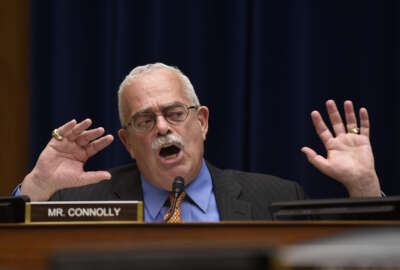The federal workforce is facing major headwinds from President Donald Trump’s administration and certain lawmakers that may soon devolve into an outright hostile environment, experts say.
They point to potential retirement cuts looming in Congress, investigations into reassignments at the Department of Interior, and potentially devastating budget cuts at the Environmental Protection Agency as examples, and outlined a few overarching challenges feds will have to endure or overcome in the near future.
“We’re in trouble at the bureaucracy,” Paul Verkuil, senior fellow at the Center for American Progress and former chairman of the Administrative Conference of the United States, said at CAP’s Oct. 18 panel on The Value of a Professional Government Workforce. “It would seem to be self-evident that you should value bureaucracy. You may not love bureaucracy. It has a Janus-face situation: sometimes you love it, sometimes you hate it … but we are now at the point where it’s in jeopardy, deeply in jeopardy.”
One of the challenges Verkuil named specifically was the movement for at-will employment. A bill was introduced in the House of Representatives in July that would classify new federal hires as at-will employees, which means they could be removed or suspended without notice or right to appeal for any reason, or no reason at all.
“Now at-will public employment is not 100 percent wrong, because it would be good if you could monitor that in a non-political way and clear out people that are not doing their job,” Verkuil said. “So we don’t want to overreact to at-will, but at-will’s motivation is to remove the experienced people in government and replace them with contractors who are more easy to manage.”
And replacing feds with contractors isn’t a far-fetched idea. The specter of privatization is looming large in the minds of federal unions, who fear proposed moves at the Veterans Affairs Department will go in that direction. And President Trump urged privatization of the Federal Aviation Administration this summer.
Verkuil pointed out that the federal workforce has the same number of employees in 2017 as it did during the Kennedy administration, despite the creation of the Departments of Education, Health and Human Services, Homeland Security and various agencies, as well as a roughly 40 percent increase in the total U.S. population during that interval.
And yet one popular narrative is that the federal workforce has become too large, and must be pruned. But the work still has to be done by someone.
“Who fills the gap? The gap is filled by contractors, primarily,” Verkuil said. “So you’re talking … four contractors, five contractors for every civil servant. And the problem is they’re in positions that really are steady, judgement-oriented, what we call ‘inherently governmental’ positions.”
OMB circular A-76 defines inherently governmental activities as one that is “so intimately related to the public interest as to mandate performance by government personnel.” And Verkuil sees two main differences between government personnel and contractors.
“For me, the first reason is the oath of office. You may not think about it, it may be just a symbolic act, but … it means something,” he said. “It differentiates you, it separates you. It should; you took an oath to uphold the constitution. It’s meaningful. … If you don’t take the oath, you’re not in the same club, if you will. It’s an important club.”
And that speaks to another difference Verkuil pointed out: motivation. Federal workers overwhelmingly point to the mission of public service as one of their primary motivations for what they do. Contractors don’t.
“Economists talk about public choice theory, and that everyone is maximizing something,” Verkuil said. “Government officials are maximizing their jobs and the size of their office, but contractors are exclusively exercising the bottom line, supporting that.”
And relevant to that, Verkuil pointed out that contractors can be more expensive than federal workers.
But they’re also convenient. He said while the hiring process can last up to a year for federal employees, and security clearances can take even longer to acquire, federal contractors can frequently be hired in a much shorter period of time, and already have the necessary clearances.
“We can improve things without destroying the civil service. I think we should have some reform,” Verkuil said. “The civil service is just too important to ignore.”
He compared the plight of the federal workforce and the way they’re treated as a political football to the way veterans were treated in the aftermath of the Vietnam War.
“I served in the military during the period of Vietnam. I wasn’t in Vietnam. But I know how it was when people came back, and how hard it was when you were in the military then,” he said. “This is almost the way we feel about the civilian side. The military does great things, many times. Sometimes it errs. But we’re always willing to honor the people who put military service in.”
He said the U.S. needs to reach a point where we are honoring and respecting everyone who put civilian service in.
“Many of them make great sacrifices. It’s not quite comparable, but it’s very close,” he said. “And yet the attitudes are just so diametrically opposed. I’d like to see a little sharing of that goodwill.”
Copyright
© 2024 Federal News Network. All rights reserved. This website is not intended for users located within the European Economic Area.
